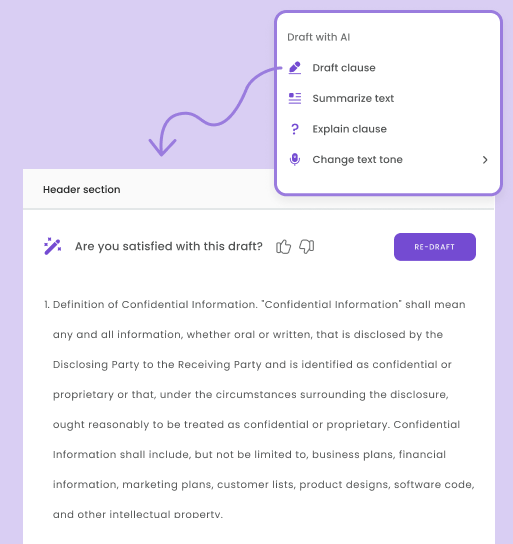Generally speaking, unless you have a written agreement, you’re not contractually obligated to another party even if you or they do work or perform services.
There is an exception to this rule known as a quasi contract. Even if you don’t have a formal agreement, you may be required to honor certain obligations.
In this guide, you’ll learn what quasi contracts are, situations where they’re applicable, the different types of quasi contracts, and more.
Basis of Quasi Contracts
A quasi contract, also known as an implied contract or a constructive contract, is a legal concept used to enforce obligations between parties even in the absence of a formal agreement.
It’s not a true contract in the traditional sense because it does not arise from the mutual assent of the parties. Instead, quasi contracts are imposed by courts to prevent unjust enrichment or unfairness when one party has received a benefit at the expense of another.
Absence of Formal Agreement:
In a quasi contract, there’s no explicit, voluntary agreement between parties regarding the exchange of goods, services, or other benefits.
Unlike express contracts where parties explicitly negotiate and agree upon the terms, quasi contracts arise out of circumstances where one party has received a benefit from another without a prior agreement.
It’s important to note that quasi contracts are created by courts to prevent unjust enrichment or unfairness. When one party has received a benefit from another without an agreement, the law imposes obligations on the beneficiary to compensate the other party for the value of the benefit received. This principle is based on equitable principles of fairness and restitution.
It’s also important to note that quasi contracts cannot and will not be applied across the board. This is in part to prevent people from performing unwanted services and demanding payment.
Quasi contracts are legal constructs that impose contractual obligations on parties even in the absence of a formal agreement. They are based on equitable principles and are designed to prevent unjust enrichment or unfairness when one party has received a benefit at the expense of another.
Elements of a Quasi Contract
Unjust Enrichment:
Unjust enrichment is a fundamental concept underlying quasi contracts. It refers to a situation where one party benefits unfairly at the expense of another.
This occurs when a party receives a benefit or gains something of value without providing proper compensation or consideration in return.
In essence, unjust enrichment involves one party profiting or gaining an advantage in a manner that is deemed inequitable or unjustifiable under the circumstances.
The role of unjust enrichment is pivotal in forming quasi contractual obligations. When one party has been unjustly enriched at the expense of another, the law intervenes to rectify the imbalance by imposing obligations on the enriched party to make restitution or provide compensation.
Quasi contracts serve as a legal mechanism to ensure fairness and prevent one party from retaining a benefit acquired through unjust means.
Lack of Legal Contract:
In quasi contracts, there is a conspicuous absence of a formal legal contract. This absence encompasses various elements of contract formation, including offer, acceptance, consideration, and mutual assent.
Unlike express contracts where parties explicitly negotiate and agree upon the terms, quasi contracts arise from circumstances where one party has received a benefit from another without the establishment of a formal agreement.
The lack of a legal contract in quasi contractual relationships means that there is no binding obligation based on the traditional elements of contract formation.
Despite the absence of a formal agreement, quasi contracts carry legal implications and obligations. Courts recognize and enforce quasi contractual obligations to prevent unjust enrichment and ensure fairness between the parties involved.
Exceptions to the lack of a legal contract in quasi contracts exist in certain circumstances. For instance, when one party confers a benefit to another with the reasonable expectation of receiving compensation or when a party knowingly accepts and retains a benefit, the law may imply a contractual relationship to prevent unjust enrichment.
These exceptions reflect the equitable nature of quasi contracts and the courts’ commitment to addressing unfairness and ensuring justice in contractual relationships.
Circumstances Leading to Quasi Contracts
Mistake or Misunderstanding:
Mistakes or misunderstandings can lead to the formation of quasi contracts when parties agree to a misconception or false belief.
Instances where one party mistakenly believes they have a legal obligation to provide goods or services to another party, or where one party mistakenly believes they are entitled to a benefit, may give rise to quasi contractual obligations.
In such cases, despite the absence of a formal agreement or mutual assent, courts may intervene to rectify the situation through quasi contracts.
Quasi contracts serve as a means to correct the unjust enrichment that may result from parties’ mistakes or misunderstandings by imposing obligations on the party who received a benefit to provide compensation or restitution to the other party.
Emergency Situations:
When urgent actions are taken for the benefit of another party in an emergency situation, quasi contractual obligations may arise.
For example, suppose one party provides necessary medical treatment or assistance to another party in an emergency without prior agreement. In that case, the law may imply a quasi contractual relationship to ensure that the benefiting party compensates the provider for the value of the benefit received.
Quasi contracts play an essential role in emergencies by facilitating compensation and preventing unjust enrichment, even in the absence of a formal agreement or prior understanding between the parties.
Types of Quasi Contracts
Two major types of quasi contracts are derived from Latin words. They’re called Quantum Meruit and Quantum Valebant. Let’s look at each one in turn.
Quantum Meruit
Quantum meruit, Latin for “as much as he deserved,” is a type of quasi contract that deals with the payment for services rendered.
When one party performs services for another without a formal agreement regarding compensation, the law may imply a quasi contractual obligation for the benefiting party to pay a reasonable amount for the services received.
The criteria for determining reasonable compensation in quantum meruit claims include factors such as the nature and extent of the services rendered, prevailing market rates, and any special circumstances surrounding the performance of the services.
Quantum meruit ensures that individuals are fairly compensated for their labor and efforts, even in the absence of a formal contract outlining payment terms.
Quantum Valebant:
Quantum valebant, which translates to “as much as they were worth,” is another type of quasi contract that pertains to the payment for goods or property.
When one party supplies goods or property to another without an explicit agreement on price or compensation, the law may imply a quasi contractual obligation for the receiving party to pay the reasonable value of the goods or property received.
Establishing the value of goods or services in quantum valebant claims involves assessing factors such as the quality, quantity, and market value of the goods or property at the time of supply.
Quantum valebant ensures that parties are fairly compensated for the value of the goods or property exchanged, even in the absence of a formal contractual agreement specifying the terms of payment.
Legal Enforceability of Quasi Contracts
Courts have the authority to enforce quasi contractual obligations through equitable remedies, which are designed to achieve fairness and justice.
Courts have the discretion to award various equitable remedies to address the unjust enrichment resulting from quasi contractual relationships.
These remedies may include restitution, specific performance, or injunctive relief, depending on the circumstances of the case.
Restitution requires the party who benefited from the quasi contract to return any gains or benefits acquired unjustly to the other party.
Specific performance may be ordered when monetary compensation alone is insufficient to remedy the injustice, requiring the benefiting party to fulfill their obligations under the quasi contract.
Injunctive relief may be granted to prevent further unjust enrichment or to compel compliance with quasi contractual obligations.
However, there are limitations on the available remedies in quasi contractual cases. Courts must balance the interests of both parties and consider the principles of fairness and equity when determining the appropriate remedy.
Additionally, equitable remedies are discretionary and may not always be granted, particularly if there are legal defenses or mitigating factors present.
Furthermore, the availability of specific remedies may be subject to statutory or judicial limitations, and courts may consider factors such as the parties’ conduct, the nature of the benefit conferred, and the feasibility of enforcing the remedy.
Differences Between Quasi Contracts and Other Contracts
Comparison with Express Contracts:
The primary distinction between quasi contracts and express contracts lies in the formation of the agreement.
In express contracts, parties explicitly negotiate and agree upon the terms and conditions of their contractual relationship.
These agreements are typically written or oral and clearly outline the rights and obligations of each party.
In contrast, quasi contracts arise when there is no explicit agreement between the parties. Instead of relying on the parties’ expressed intentions, quasi contracts are imposed by the court to prevent unjust enrichment or unfairness.
Intent plays a crucial role in the formation of express contracts, where both parties must demonstrate a clear intention to be bound by the terms of the agreement.
Express contracts require mutual assent or a meeting of the minds between the parties regarding the essential terms of the contract.
In quasi contracts, however, the parties’ intent to enter into a contractual relationship is not relevant. Quasi contracts are imposed by the court irrespective of the parties’ intentions, focusing instead on preventing unjust enrichment and ensuring fairness in contractual relationships.
Comparison with Implied Contracts:
Unlike implied contracts, which are formed based on the parties’ conduct or implied intentions, quasi contracts lack mutual assent or a meeting of the minds between the parties.
Implied contracts may arise when the parties’ actions or circumstances suggest an intention to be bound by contractual terms, even in the absence of an explicit agreement.
In contrast, quasi contracts are not based on the parties’ implied intentions but are instead imposed by the court to prevent unjust enrichment or address unfairness in certain situations.
Implied contracts encompass a broad category of contractual relationships that are inferred from the parties’ conduct, course of dealing, or the circumstances surrounding their interactions.
These contracts may be implied in fact, where the parties’ conduct suggests an intention to be bound by contractual terms, or implied in law, where the law imposes contractual obligations to prevent unjust enrichment.
Quasi contracts fall within the category of implied contracts in law, as they are created by the court to remedy unjust enrichment, despite the absence of an express or implied agreement between the parties.
The main differences between quasi contracts and other contracts, such as express contracts and implied contracts, lie in the formation of the agreement, the role of intent, and the presence or absence of mutual assent.
Quasi contracts are distinguished by their imposition by the court to prevent unjust enrichment, regardless of the parties’ intentions or explicit agreements, while other contracts are formed through express or implied agreements between the parties.
Challenges and Controversies
Criticisms of quasi contracts in legal discourse:
One of the primary criticisms of quasi contracts in legal discourse is the presence of ambiguities and subjective interpretations in their application.
The equitable nature of quasi contracts often leads to varying interpretations by different courts, resulting in inconsistency and unpredictability in outcomes.
The lack of clear guidelines or criteria for determining when quasi contractual obligations should be imposed can create uncertainty for parties involved in disputes.
Additionally, the flexible nature of quasi contracts may leave room for subjective judgments, potentially leading to unfair or arbitrary outcomes.
Due to the challenges associated with quasi contracts, there have been calls for legal reforms or clarifications to address the criticisms and uncertainties surrounding their application.
Some legal scholars and practitioners advocate for clearer guidelines or statutory provisions outlining the circumstances under which quasi contractual obligations should be imposed.
By establishing more definitive criteria or standards, reforms could help mitigate ambiguities and promote consistency in the application of quasi contracts across different jurisdictions.
Furthermore, legal reforms may seek to enhance transparency and fairness in quasi contractual disputes, ensuring that parties have a clearer understanding of their rights and obligations.
Conclusion
Quasi contracts are agreements that are imposed on a beneficiary party by the courts so the other parties will not be taken advantage of.
They’re useful to an extent but there is a lot of criticism associated with how they’re applied arbitrarily in various jurisdictions because there are no standard guidelines.
This guide has shown you what they are, the different types, and when they’re used. To protect yourself from the mercy of the courts, it’s important to create agreements whenever possible.
That doesn’t mean you have to create contracts from scratch every time. Use our platform – DoxFlowy – to automate your document creation processes.




